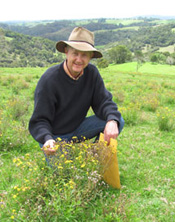Fireweed Control Research
About the Project
Through this two year research project (1 June 2010 - 30 June 2012) the University of New England and CSIRO sought to reduce the impact of fireweed (Senecio madagascariensis) on grazing industries and biodiversity in Australia. The project was funded by the Australian Government through the National Weeds and Productivity Research Program (administered by the Department of Agriculture, Fisheries and Forestry).
A native plant of southern Africa, fireweed is the worst weed of temperate and sub-tropical pastures in coastal New South Wales and south-east Queensland.
It is poisonous to livestock, and is capable of germinating and flowering through much of the year, reducing the output from beef and dairy cattle production. As a result, fireweed is of great concern to farmers.
Research Goals
- Compile data for a fireweed application under the Weeds of National Significance (WoNS) nomination process.
- Conduct research to fill gaps in our current knowledge of fireweed ecology and impacts.
- Undertake initial investigation of potential biological control agents for fireweed in South Africa.
- Identify current best practice management strategies for fireweed, and work with industry and community groups to extend these findings to agricultural landholders.
Publications
Publications include final project reports and other research papers, and the national best practice manual Fireweed: A Best Practice Management Guide for Australian Landholders.
Links
Helpful resources for fireweed management, including various state and regional management guides, relevant government organisations and community groups.

Contact
To find out more about this research, please contact the project leader, Professor Brian Sindel.

